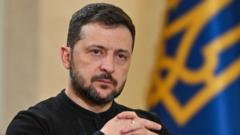Ukraine's President Volodymyr Zelensky finds himself in a precarious situation following a tense meeting with President Donald Trump that ended in disappointment last Friday. As the US has suspended military aid to Ukraine, Zelensky's options for moving forward appear increasingly limited. Once a close ally, Republican Senator Lindsey Graham has grown critical, suggesting that Zelensky should either resign or find a way to rebuild trust with the US administration.
Faced with this instability, speculation arises whether Zelensky should swallow his pride and offer an apology to Trump. This seems to be a potential avenue for Zelensky, as Ukraine's Prime Minister indicated that Kyiv is open to negotiations regarding a minerals deal with the US, potentially pivotal for both nations.
During their last meeting, Trump bluntly communicated to Zelensky that he lacked leverage in negotiations. After being abruptly dismissed, Zelensky was prepared to finalize the minerals deal, which remains a focus of his team's efforts. However, the Trump administration appears to be waiting for further concessions.
A forced apology could undermine Zelensky's position domestically and internationally. Following years of aggression from Russia, Ukrainians are not inclined toward submission. Expected to maintain a balance, Zelensky may need to express sentiments that resonate with Trump's demands while navigating the delicate landscape of public sentiment in Ukraine.
Aid suspension has raised alarms among Ukrainian officials regarding the nation’s defense capabilities. MP Oleksandr Merezhko has emphasized the risks associated with the US pulling support, especially in terms of providing critical air-defense systems. Ukrainian officials estimate they can withstand approximately six months without US backing, although they stress the importance of US involvement for advanced defense technologies.
Prime Minister Denys Shmyhal noted that Ukraine aims to increase its domestic weapon production, already generating a third of its military needs, with plans to expand further. Despite this, reliance on European support is also a consideration. European nations have largely supplemented US aid to Ukraine, with the EU proposing up to €800 billion in defense funding aimed at bolstering capabilities, including assistance for Ukraine.
Yet, both the EU and the UK recognize that US security guarantees remain essential, particularly as discussions of a ceasefire arise. Zelensky's administration must tread carefully, aware that any misstep could empower adversaries, including Russian President Vladimir Putin, who has long sought to undermine Ukraine's leadership.




















